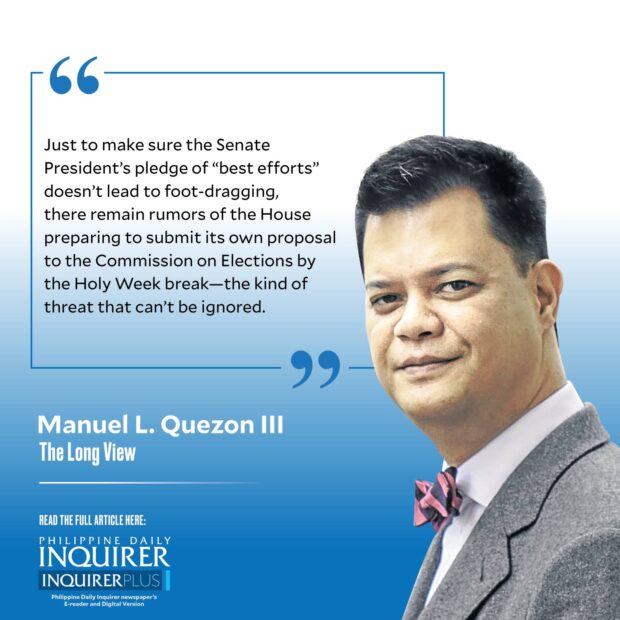Declaring victory

It’s said that an American senator once advised his government, “Let’s declare victory and get out.” He was referring to the quagmire that Vietnam had become. Something similar could be said about Rodrigo Duterte who declared at the Feb. 25 “prayer rally” in Cebu, “I will support the changes in the Constitution—its economic provisions and even the term of the president, I am OK with it, as long as it does not favor the incumbent leaders or those who will be elected in the coming elections.” This is different from his fierce, even secessionist, opposition to any amendments at all prior to the Quiboloy-centered show of force timed to coincide with the Edsa anniversary.
The show of force itself was striking for the contrast between its prayerful title and Willie Revillame accompanied by over a dozen girls dancing on stage. The reason for the “prayer rally” was, of course, fear of the Federal Bureau of Investigation, President Marcos, and Sen. Risa Hontiveros on the part of Apollo Quiboloy, who has gone into hiding to evade both questions and possible extradition. The government has been rather strict with Quiboloy’s media, and as a result, Duterte’s media reach has been diminished somewhat; though the question remains if the former president has used his popularity wisely, or dissipated it to the extent he risks being lumped together with the lunatic fringe. The former president, who has moderated his Charter change opposition, suggests he’s taken an inventory of the forces at play and that his successor, and not he, is in a position to dictate the outcome of events.
A sign this may be so was Senate President Juan Miguel Zubiri saying that the President told a majority of senators at the Palace that he preferred constitutional amendments to be submitted for a plebiscite to coincide with the 2025 midterm elections, and not sooner, which is what the House of Representatives supposedly prefers. There remains the problem of a 1987 ruling of the Supreme Court forbidding the simultaneous holding of elections and plebiscites, but it may be easier for the Supremes to revisit the question now that close to 40 years have elapsed.
The House, through its Speaker, gamely responded to Zubiri by saying they would be happy to meet the Senate halfway and approve amending the economic provisions of the Constitution by means of each chamber voting separately. The Speaker then convened the House as a Committee of the Whole, to approve Resolution of Both Houses No. 6, the Senate’s proposal, and thus, ditching the bone of contention which was the House’s RBH 6, which had proposed both chambers voting as one.
Zubiri for his part gave a more detailed timeline of possible events: the Angara committee could expedite its work, while a “Senate constituent assembly” could convene by April 29 (the day after Congress returns from its Holy Week recess), with the process concluding by May 25.
Back in the day, the late Joaquin Bernas SJ proposed Congress tackling constitutional amendments like legislation: each chamber debating and voting upon a proposed amendment according to its own rules, and threshing out any differences, in the end, in a bicameral committee which in turn, would submit its output for final approval by each chamber voting separately. The Senate President’s language seems to suggest this is the approach he is eyeing and which the House might go along with.
Just to make sure the Senate President’s pledge of “best efforts” doesn’t lead to foot-dragging, there remain rumors of the House preparing to submit its own proposal to the Commission on Elections by the Holy Week break—the kind of threat that can’t be ignored. The clincher, though, is that the President’s name was invoked, and that invocation, followed by behavior on the part of leaders of both chambers, indicates that they have their marching orders. The debate will now be limited to rather unexciting topics: as the Speaker puts it, loosening restrictions “on foreign equity ownership in corporations, including those that operate public services” and allowing foreign ownership of education institutions and advertising agencies.
Email: mlquezon3@gmail.com; Twitter: @mlq3




















